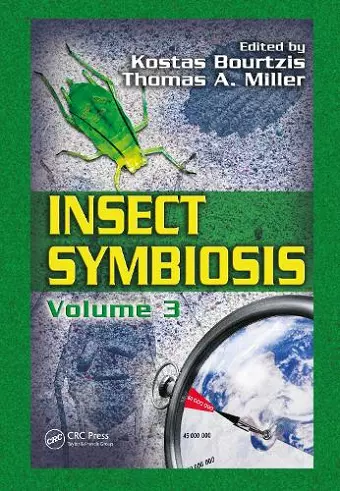Insect Symbiosis, Volume 3
Thomas A Miller editor Kostas Bourtzis editor
Format:Hardback
Publisher:Taylor & Francis Inc
Published:28th Oct '08
Currently unavailable, our supplier has not provided us a restock date

The associations between insects and microorganisms, while pervasive and of paramount ecological importance, have been relatively poorly understood. The third book in this set, Insect Symbiosis, Volume 3, complements the previous volumes in exploring this somewhat uncharted territory. Like its predecessors, Volume 3 illustrates how symbiosis research has important ramifications for evolutionary biology, microbiology, parasitology, physiology, genetics, and animal behavior, and is especially relevant to the control of agricultural and disease-carrying pests worldwide.
Insect Symbiosis, Volume 3, includes pioneering chapters on Paratransgenesis in termites, Bacterial symbionts in anopheles spp. and other mosquito vectors, Endosymbionts of lice, and the Structure and function of the bacterial community associated with the Mediterranean fruit fly. These individual studies suggest practical applications in pest control involving novel, pesticide-free, biological control approaches.
This new volume adds to the growing body of knowledge on the ubiquitous endosymbiont Wolbachia. This bacterial genus and its potential as a weapon against insect pests and vectors have been covered in the first two volumes of Insect Symbiosis. Volume 3 contains chapters on Wolbachia and anopheles mosquitoes, Feminizing Wolbachia and the evolution of sex determination in isopods, and Wolbachia–induced sex reversal in Lepidoptera.
The book examines symbiotic relationships in the context of how host organisms recognize their own cells as self and other cells or potentially parasitic or pathogenic organisms as nonself, allowing researchers to make predictions of compatible and incompatible interactions. Following in the tradition of the first two volumes, this book serves as a great reference on host-parasitic relationships for professionals from a broad range of disciplines.
Each reader will find chapters to delight him- or herself. … should find a home in every biology library… a solid introduction to students, and extensive reviews of the past 20 years of research for professional investigators. They also will provide hours of enjoyable reading. The books represent the flowering of decades of research by dozens of pioneering scientists, and show how important symbiosis is to the biological sciences. The topic is so rich, and the investigators so productive that the editors could continue to produce a new volume every 3 years, indefinitely. Let’s hope they do.
— Michael F. Dolan, University of Massachusetts, Amherst, USA
". . . chapters are like reviews and provide a good, and accurate, background of the topic under discussion. The wide-ranging nature of the content ensures that this book has something for everyone with an interest in symbiosis and it would be a useful addition to the bookshelf of any researcher with an interest in symbiosis in general."
– David Clarke, University College Cork, in Microbiology Today, May 2009
"This volume is a step forward in advancing the goal of using our knowledge about endosymbionts for practical pest management programs."
– Marjorie A. Hoy, Entomology & Nematology Department, University of Florida, in Florida Entomologist, June 2009, Vol. 92, No. 2
ISBN: 9781420064100
Dimensions: unknown
Weight: 975g
532 pages